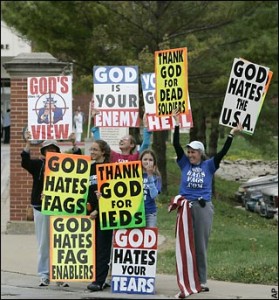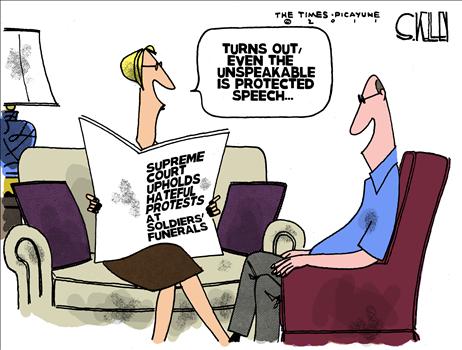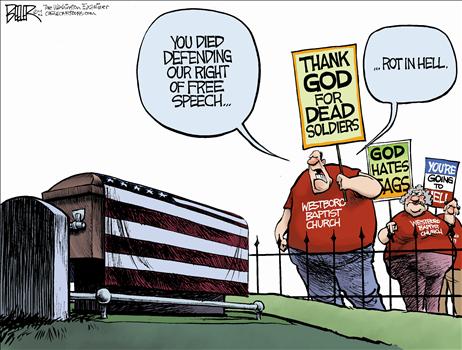Yesterday’s post was on Libya because I had inquiries about my thoughts on that subject. Today’s post also stems from an inquiry, this time about a recent Supreme Court decision on freedom of speech involving the Westboro Baptist Church of Topeka, Kansas. It seems that most of its members are part of one extended family, and that there are fewer than 100 people in the congregation. I’m not really keen on calling this group a church because I don’t believe they manifest the true heart of God.
 What they are mostly known for is protesting soldiers’ funerals and condemning homosexuality. You can see some of their wonderful signs in this picture. The reason they ended up as part of a Supreme Court case is that they showed up to protest the burial of a soldier in 2007 and the soldier’s father took them to court.
What they are mostly known for is protesting soldiers’ funerals and condemning homosexuality. You can see some of their wonderful signs in this picture. The reason they ended up as part of a Supreme Court case is that they showed up to protest the burial of a soldier in 2007 and the soldier’s father took them to court.
In the case of Snyder [no relation] v. Phelps, the Court upheld the right of the protesters to speak their minds [such as they are].
Some are outraged by this decision, and I understand that from an emotional point of view. However, the Court is supposed to rule based on law, not emotion. Surprisingly, both liberals and conservatives on the Court agreed in upholding this group’s First Amendment right of free speech. The vote was 8-1, with only conservative justice Samuel Alito in dissent.
As much as I detest their views—they hate the U.S., rejoice when American soldiers die, and burn the American flag—I have to agree with this decision. Why? What they are involved in is political speech, and they have the right to say what they believe. If they are kept from speaking, what is to stop the government from telling me I can’t write this blog anymore if my views don’t line up with a prescribed political correctness?
The cartoons, of course, are on both sides of the issue. I believe this one is opposed to the decision. See what you think:
However, this one at least recognizes the heart of the matter:
The Westboro people are unsavory. More than that, they do not manifest the love of God. Now, I’m not talking about a wishy-washy “I’m okay, you’re okay” love. That isn’t love at all. God tells us to speak the truth. On the issue of homosexuality, for instance, they are correct when they say it is a sin. However, I see two problems with their approach: first, they seem to delight in calling people sinners; second, they forget the second half of the message—God wants to deliver people from their sins. All they care about, apparently, is pointing out sin, not leading people, through repentance, to the Redeemer who is willing to forgive those sins.
What really disturbs me is that some will decide to lump me and others in with the Westboro loons. I have written on a number of occasions that homosexuality is an offense against the holiness and righteousness of God. That is simply speaking what the Scriptures say. Unlike the Westboro group, though, I go on to offer hope that anyone caught in that sin can be set free.
Why is it so important then that the Supreme Court upheld their right to speak, no matter how detestable their views? If it hadn’t, there might have been an open war on all Christians who speak out against a sin such as homosexuality.
So what can be done to stop a group like this from disrupting a funeral? First, from the accounts I read, they didn’t actually disrupt it. They were kept at a distance, and those at the funeral never heard them. They saw a report later on the news and were offended by the Westboro actions. That’s what led to the court case.
There’s an issue of federalism here. While the federal government cannot put a stop to their speech, local governments are free to enact ordinances limiting access to a funeral, which is what actually happened in this case. The Westboro people still had their opportunity to say what they wished, but they weren’t allowed to say it up close while the funeral was being conducted. Allowing them to disrupt any funeral would be to deny the freedom of speech that those attending the funeral also possess. They have the right to say what they choose as they bury their dead.
So it can be handled at the local level, which is the genius of federalism. Not everything should be a federal case. Within the boundaries set up by the Constitution, there is plenty of room for action by local governments.
The Supreme Court ruled correctly this time.


